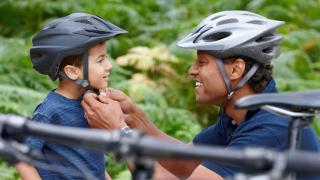
Our community is grieving after the shooting at Annunciation Catholic Church/School in South Minneapolis on the morning of August 27th, 2025. Two children were killed, and many others were injured. As you are working to be present for yourselves and your loved ones, know that our Hennepin Healthcare community is holding every child, family, educator, and staff member in care.
What helps kids most right now
- Start by asking, not telling. "What have you heard? What questions do you have?" Let your child's words guide how much you share. Keep explanations short, simple, and honest.
- Reassure safety with specifics. Name concrete protections (trusted adults at home/school, doors, drills, how helpers responded today). Predictability calms fear.
- Limit media. Turn off breaking-news loops and keep graphic images away from kids; co-view with teens and help them fact-check rumors.
- Model regulation. Kids borrow our nervous systems. Take your own pause; then speak calmly. It's okay to say, "I feel sad and we're safe."
- Keep routines. Meals, sleep, school, faith/community rituals—familiar rhythms restore control.
Psychological First Aid in times of tragedy includes five essential elements for support in the immediate and early period following these events: promoting and communicating about safety for our loved ones, encouraging calming/grounding activities, underscoring our connectedness with close others, reminding each other of our capacity to identify our needs as well as lean on supportive community, and grounding ourselves in hope.
Age-by-age guidance (with sample language)
- Preschool (3–5): One or two sentences, then comfort. "Something scary happened at a school. You're safe here. Grown-ups are helping." Expect clinginess and sleep changes for a bit.
- Elementary (6–11): Correct rumors, invite questions, avoid details. "A person hurt people at a church school. The police and doctors helped. Your school has safety plans. What are you wondering about?"
- Middle/High School (12–18): Be direct, check their social media/news feeds (ideally review these with them – to be able to offer guidance, coaching, corrective information where needed), and engage their values/agency. "This is hard and unfair. Let's talk about what you're seeing online and what's real. How can we help you feel safe tomorrow?"
If your child or family was directly affected
- No forced retelling. Children don't need to narrate what happened unless they choose to; mandatory "debriefing" isn't recommended and can hinder recovery. Offer presence, not pressure.
- Attend to basics first. Warmth, hydration, small meals, rest, and being with trusted people all matter more than "processing" in the first days.
Red flags that mean it's time for extra help
- Intrusive memories or play that won't let up; severe sleep problems; persistent physical complaints; withdrawal, agitation, or aggression; overwhelming guilt/shame; talk of self-harm; or distress that isn't easing after a few weeks. Reach out (pediatrician, mental health provider) sooner if your child already struggles with anxiety, depression, or trauma.
Where to get support now
- 988 Suicide & Crisis Lifeline (call/text/chat 988) – free, confidential, 24/7.
- Hennepin County Cope Mobile Crisis (all ages): 612-596-1223 – 24/7 phone support and in-person response. (if outside of Hennepin County, search for "_____ County mobile crisis" in your web browser)
- Your school counselors, pediatrician/Primary Care Provider, and faith leaders are partners in care.
What not to do
- Don't share graphic details or speculate about motives.
- Don't promise "nothing bad will ever happen," but do emphasize the many adults working to keep kids safe.
- Don't make kids comfort adults; get your own support so you can be steady for them.
We will, together, keep showing up—for the children who were harmed, for their families, and for every young person who is scared on account of today's events. Further reading/resources: National Child Traumatic Stress Network: Talking to Children about the Shooting; National Association of School Psychologists: Talking to Children About Violence: Tips for Families and Educators Healthy Children (American Academy of Pediatrics): How to Talk With Kids About Tragedies & Other Traumatic News Events - HealthyChildren.org


